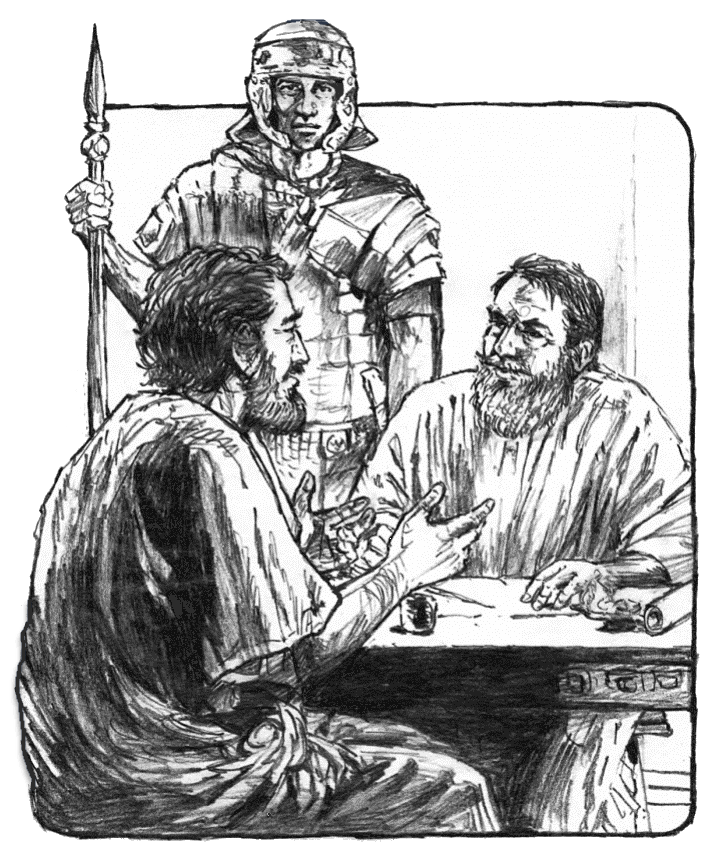

“ 19 Reasons Why Paul Wrote Hebrews”
Who would stand to gain with a
denial of Paul’s authorship of the Hebrews epistle?
1. The 1611 translators told no
lies with their knowledge of all sources and manuscripts. If you are a King James
Bible Believer you would know that a photographic copy of the 1611
King James New Testament reads
“THE EPISTLE OF PAVL
The Apoftle to the Hebrewes”
2. The Scofield Reference Bible (1917)
has the heading of the Book of Hebrews:
“THE
EPISTLE OF PAUL THE APOSTLE TO
THE
HEBREWS”
3. Over one hundred ancient
writers from 70-730 AD attest to the fact of Paul’s
authorship.
4.
The Council of Laodicea in 363 AD, the Council of Carthage in 397
AD and all the Syrian churches in 370 AD, held to the fact that
Paul wrote the Book of Hebrews.
5. The Eastern churches and
the Greeks from the earliest centuries endorsed Paul as author of the
Book of Hebrews.
6. In the Alexandrian
manuscript MSS 500AD, Paul is named as author.
7. Peter, the apostle to
the Jews and writing to them, confirms Paul’s authorship of
Hebrews in 2 Peter 3:15 stating
“… even as our beloved brother Paul … hath written unto you; as also in all his
epistles …”
8. Paul is the only New
Testament writer to request prayer for himself (Heb 13:18; 1Thess 5:25; 2Thess 3:1; 2 Cor 1:11).
9. No other New Testament
writer, other than Paul, mentions Timothy. Paul refers to him 20 times
(seven times specifically by name) and calls him brother (Heb 13:23;2 Cor 1:1; Col 1:1; 1 Thess 3:2; Phil 1:1,).
10. Paul was the only writer
who writes from prison, expecting and looking for release (Heb 13:19-23; Phil 1:7-8,13-26
Philippians 2:23-24).
11. Blamed for Rome’s fire in 64AD,
Nero re-captures Paul who pens Hebrews around 68AD during his second
captivity in Rome, prior to Titus’ invasion.
12. The conclusion of Hebrews 13:25 is similar to the endings of Paul’s
other epistles with “Grace be with you all.” (v25). See Rom 16:20; 1Cor 16:23; 2Cor 13:14; Gal 6:18; Eph 6:24; Phil 4:23; Col 4:18; 1Thess 5:28; 2Thess 3:18; 1Tim 6:21; 2Tim 4:22; Titus 3:15; Philemon 25. After reading his
Hebrews epistle, Paul hopes that Messianics would become saved and as such he
salutes them with the church ending of God’s grace.
13. Paul, in Galatians and Hebrews,
is the only New Testament writer who presents the abolition of the old
covenant.
14. There are no
contradictions in the Book of Hebrews with Paul’s other epistles.
15. There is no record of
Apollos, Barnabas or Luke (other ‘authors’) being in jail twice.
16. There are similarities in
style and content between Hebrews and the other epistles of Paul with
the thoughts and reasonings being Paul’s. Any differences are due to the
fact, that Paul is writing to unsaved Messianic Jews and not to the church saints.
God chose the right words needed for both readers eg ‘gazingstock’ (Nah 3:6; Heb 10:33) would mean something for the Jew
whereas ‘spectacle’ (1Cor 4:9) is used for the church. Furthermore,
Paul is the only Bible writer to use the words “communicate”, “mediator”,
“wellpleasing” and “the God of peace”
|
Heb 5:12 teachers,
milk, meat |
1 Cor 3:2 teachers, milk,
meat |
|
Heb 8:1 set on the
right hand of the throne of the Majesty in the heavens |
Eph 1:20 set him at
his own right hand in the heavenly places |
|
Heb8:6 9:15 12:24 promises,
mediator |
Gal 3:19-20; 1Tim 2:5 mediator,
promise |
|
Heb 10:1 the law
having a shadow of good
things to come |
Col 2:17 which are a
shadow of things to come |
|
Heb 10:33 made a
gazingstock, reproaches,
afflictions |
1 Cor 4:9 made a
spectacle, appointed to death |
|
Heb 12:3 lest ye be
wearied and faint in your minds |
Gal 6:9 let us not
be weary …if we
faint not. |
|
Heb 12:14 follow peace
with all men |
Rom 12:18 live
peaceably with all men |
|
Heb 13:1-3 brotherly love continue |
Eph 5:2-4 walk in love |
|
Heb 13:9 be not
carried about with divers and strange doctrines |
Eph 4:14 tossed to and fro, and carried
about with every wind of doctrine |
|
Heb 13:10 We have an
altar, whereof they have no right to eat which serve the tabernacle. |
1 Cor 9:13 live of the
things of the temple? and they which wait at the altar are partakers with the
altar 1Cor10:18 are not they
which eat of the
sacrifices partakers of the altar |
|
Heb 13:16 with such
sacrifices God is well pleased. |
Phil 4:18 a sweet
smell, a sacrifice acceptable, wellpleasing to God |
|
Heb 13:16 communicate |
Gal 6:6 communicate Phil 4:14 communicate 1Tim 6:18 communicate |
|
Heb 13:20-21 Now the God
of peace, wellpleasing in his sight, through Jesus Christ |
Rom 15:33 Now the God of peace
Rom 16:20 the
God of peace Phil 4:9 the God of peace 2Cor 13:11 the God of love and peace 1Thess 5:23 the very God of peace….
blameless unto the coming of our Lord Jesus Christ |
17. Rome’s hatred for the one sacrifice
As Paul’s
Hebrew epistle scathingly denounces Roman Catholic doctrine, we are not
surprised that Rome seeks to discredit it and deny the authorship.
Their
doctrine of the repeated sacrifice of Jesus is put to the sword with the
following:
“… but now once in the end of the
world hath he appeared to put away sin by the sacrifice of himself.” (Heb 9:26)
“By the which will we are sanctified through the
offering of the body of Jesus Christ once for all.” (Heb 10:10-12)
“And every priest standeth daily ministering and
offering oftentimes the same sacrifices, which can never take away
sins: But this man, after he had offered one sacrifice for sins
for ever, sat down on the right hand of God” (Heb 10:11-12)
“For by one
offering he hath perfected for ever them that are sanctified.”
The above verses categorically oppose and denounce,
the Roman Catholic tradition of continually re-crucifying Jesus Christ, and
their belief that the wafer is the actual body of Jesus Christ.
Furthermore, we are reminded “… where remission of
these is, there is no more offering for sin.” (Heb 10:18) for “…if we sin wilfully after that we
have received the knowledge of the truth, there remaineth no more sacrifice
for sins,” (Heb 10:26).
Rome states that the above verses are false, in
that, when a Roman Catholic priest so commands, the Lord Jesus Christ can
appear in wafer form to put away sin.
We note how Rome’s leading theologian, “Saint”
Alphonsas de Liguori, called ‘The Angelic Doctor of Rome’ and author of
“The Glories of Mary”, blasphemously puts it:
“We clergy stand as high above governments, above
emperors, kings and princes as the heaven above the
earth. The kings and princes of this earth are as inferior to us priests,
as lead is to the most refined gold. Angels are far inferior to us priests,
for we can in God’s stead forgive sins, which neither angels or
archangels could ever do. We are above the mother of God because she has born
Christ only once, while we priests can produce and create Him daily. In
short, we priests are in some degree above God for He must be at our service
at all times and in all places and at our command the consecration of the mass
descends from heaven. God has certainly created the world with the words
“Let there be” but in the words “Let there be”, WE PRIESTS CREATE GOD
HIMSELF.”
18. Rome’s
hatred for Paul
In the
scriptures, Paul (1Cor 11:1), not Peter, is clearly stated as the
Numero Uno Christian ensample in all matters of faith, doctrine and practice. (1Cor 4:16, 1Co 9:17 ; Phil 4:9, Php 3:17; Gal 4:12; 2 Tim 2:8 and Rom 2:17). If Rome can say that someone of
lesser importance with lesser credentials than Paul wrote the Hebrew epistle,
they can then deny and minimize the importance of God’s devastating demolition
of Rome contained in Chapter Ten.
19. Rome’s
love of Replacement Theology
Straight
from the bowels of Rome, and backed by higher German criticism, is the denial
of God’s choice of Paul, being an “…Hebrew of the Hebrews...” (Phil 3:5), to author God’s “Epistle to the Hebrews”.
Although a
little more subtle, the emergence of another evil head on the monstrous hydra
of Jew replacement is revealed. Replacement takes many forms and
here God’s perfect choice of author has been replaced by “Take Your Pick.”
Harley Hitchcock
www.
AustralianBibleMinistries
.com

ACCURATE BIBLE KNOWLEDGE!
Question: “WERE SAINTS IN THE OLD TESTAMENT
SAVED THE
SAME WAY AS SAINTS IN THE NEW TESTAMENT?”